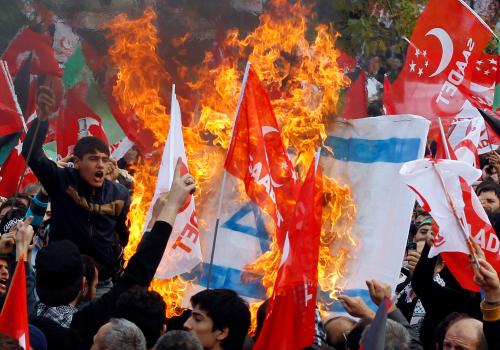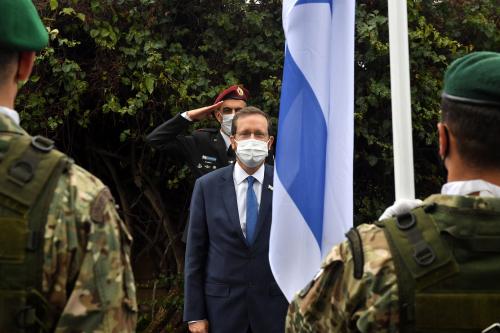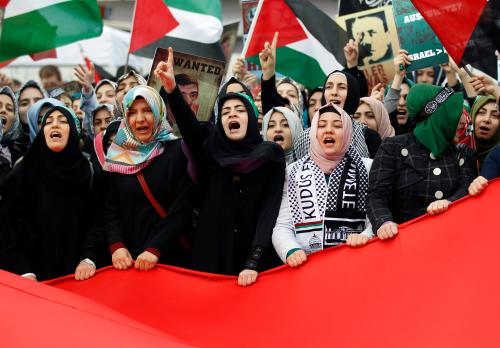One year ago, senior representatives of Turkey and Israel signed a normalization agreement, bringing an end to a six-year crisis in their relationship and finally putting to rest the Mavi Marmara incident of May 31, 2010. This week, tensions between the two countries over the situation in Jerusalem’s Temple Mount erupted, reminding officials, experts, and ordinary citizens that normalization has not resolved fundamental problems between Turkey and Israel.
Positive Trends
During the past year, there have been positive trends in the relationship. Israel and Turkey have each implemented the provisions of the normalization agreement, paving the way for the return of ambassadors.
Israel has paid $22 million as compensation to the families of the nine Turks killed in the Mavi Marmara incident. It has also eased some of the restrictions on Turkish imports (through Israel) into Gaza, and has not stood in Turkey’s way as it advances humanitarian projects there.
The Turkish parliament passed legislation cancelling all pending lawsuits against Israelis involved in the Mavi Marmara incident, blocking any future attempts to prosecute Israelis involved. Additionally, Turkey says it curtailed operations from Turkish soil by Hamas’ military wing, allowing Hamas to operate in Turkey only as a political movement.
Since normalization began, other positive trends include the resumption of the long-stalled political and diplomatic dialogue between the two governments, including the launch of an official Energy Dialogue focused on a potential natural gas framework agreement.
Another area where common interests have strengthened Israeli-Turkish ties is on the ongoing war in Syria, where both countries are warily monitoring the growing cooperation between Russia, Iran, and Hezbollah in support of the Assad regime.
Finally, trade—which kept bilateral ties afloat during the six-year diplomatic break—remains a key driver in the relationship, with $3.86 billion in overall trade between the two countries in 2016. Turkey is Israel’s sixth largest trading partner, and Turkish exports to Israel increased by 6 percent in 2016.
Irritants
In the last year, the relationship has also withstood several challenges. Some are “baggage” from the six-year strain, others fresh; all are tied directly to Turkey’s criticism of Israeli policies vis-à-vis the Palestinians, as well as President Erdoğan’s vision for Turkey as a future leader of the Muslim world.
Last November, in a lengthy interview with an Israeli television network, Erdoğan addressed Israel’s 2014 operation in Gaza, commenting that he cannot say whether “Israel or Hitler is more barbarous,” adding that while he did not approve of what Hitler did, “neither do I approve of what Israel has done.” The remarks set off a heated public debate in Israel over its relations with Turkey, but the Israeli government’s response was restrained.
Erdoğan also harshly criticized a new law passed in the Knesset to impose certain restrictions on the Muslim call to prayer, stating it infringes on religious freedom. Israel, this time, responded by taking aim at Erdoğan personally, saying that “those who systematically violate human rights in their own country should not lecture and take the moral high ground over the region’s sole real democracy.”
Jerusalem
The seeds of the heightened tensions over Jerusalem, which began on July 14, can be traced to the Arab Spring, which broke out in 2011, which Erdoğan (as prime minister, leading an Islamist party with a Muslim Brotherhood ideology) identified as an opportunity for Turkey to assume a leadership role of the Arab and Muslim worlds. Close ties with the Jewish state were viewed as an obstacle for Erdoğan in implementing his vision, and therefore the six-year disconnect with Israel fitted Erdoğan’s plans. His criticism of Israeli policies vis-à-vis the Palestinians, combined with aspirations to lead the Muslim world, contributed to greater solidarity with the Palestinians and also to a desire for a greater role regarding the Muslim holy sites in Jerusalem. Under Erdoğan’s directive, Turkey increased its involvement in issues concerning East Jerusalem and the Muslim holy sites (specifically the Al-Aqsa Mosque), as well as its outreach to Palestinian Arab citizens of Israel (including reportedly ties with the Muslim Brotherhood-affiliated Islamic Movement, Northern Branch). In May 2017, addressing a conference on Jerusalem in Istanbul, Erdoğan called on Turks and Muslims around the world to visit the Al-Aqsa mosque and voice support for the Palestinian struggle. “Each day that Jerusalem is under occupation is an insult to us,” he added. He compared Israeli occupation to the apartheid regime of South Africa and warned the United States not to move its embassy from Tel Aviv to Jerusalem.
In June 2017, the Israel Hayom daily newspaper—closely associated with Prime Minister Netanyahu—reported on the work of the Turkish Cooperation and Coordination Agency (TIKA) in East Jerusalem: It conducted a total of 71 projects in 12 years, including the restoration of the crescent on top of the gold-plated Dome of the Rock Mosque. The paper questioned Turkish motivations and several Israeli members of Knesset raised concerns. Turkish officials dismissed the report, underscoring Turkey’s aim of promoting the history and culture of Palestine, Jerusalem, and the Al-Aqsa Mosque.
The July 14 terrorist attack on Temple Mount and Israel’s decision to temporarily close the compound—later installing metal detectors at several entrances which it refused to remove—soon turned into a clash over who calls the shots in East Jerusalem. It’s between a Muslim Brotherhood front consisting of Turkey, Qatar, Hamas, and the Islamic Movement Northern Branch (pushing a more aggressive agenda) and a more moderate front which included Jordan, Egypt, and, at times, the Palestinian Authority’s leadership. Erdoğan’s inflammatory rhetoric and public attacks against Israel’s handling of the crisis certainly contributed to the stirring of tensions on Temple Mount. A war of words broke out between Turkey and Israel. Turkey’s top cleric, Mehmet Gormez, condemned Israel’s “closure of Al-Aqsa,” while the Ministry of Foreign Affairs in Ankara issued a statement that both condemned the violence and called for an opening of Haram al-Sharif for worshippers “through the immediate lifting of the entry ban imposed by Israel.”
Turkey’s Deputy Prime Minister , Numan Kurtulmus, described the Israeli closure as an “unacceptable decision” and “a crime against humanity.”
After Israel decided on July 21 to keep the metal detectors in place for the Friday prayers, Erdoğan increased his public condemnation of Israel’s handling of the crisis, calling upon the international community to intervene, criticizing Israel’s “excessive use of force,” demanding that Israel remove the metal detectors immediately, and calling upon Muslims of the world to come to Jerusalem and help protect the al-Aqsa mosque. Erdoğan stressed that the Ottoman Empire had ruled over the Al-Aqsa mosque for four centuries and has done so “with great delicacy and sensitivity [in sharp contrast] given today’s cruelty.”
Israel reacted angrily, noting that Erdoğan is the “last person who can lecture Israel” given his attitude towards Cypriots and Kurds. “The days of the Ottoman Empire have passed. Jerusalem was, is and always be the capital of the Jewish people.”
Israeli politicians called for a review of relations with Turkey, and Opposition Member of Knesset Yair Lapid went a step further and suggested that Israel should recognize an independent Kurdistan and acknowledge the Armenian genocide.
As Israel has removed the metal detectors and all other equipment, practically reinstating the pre-July 14 status quo, worshippers have begun returning to Temple Mount. While it may take several more days for tensions to subside, the events of recent weeks in Jerusalem have clearly scarred the nascent normalization between the two countries. The Trump administration regards Turkey as a critical player in the Middle East and is attempting to ease tensions with Ankara. Moreover, Trump is very supportive of Israel, and he and Netanyahu have a close and friendly relationship. In this context, it would be wise for the U.S administration to monitor the evolving Turkish-Israeli relationship, and not shy away from intervening if tensions escalate between America’s two traditional allies in the Middle East.










Commentary
Tensions over Jerusalem expose vulnerability of Turkey-Israel relations, one year after normalizing ties
July 31, 2017